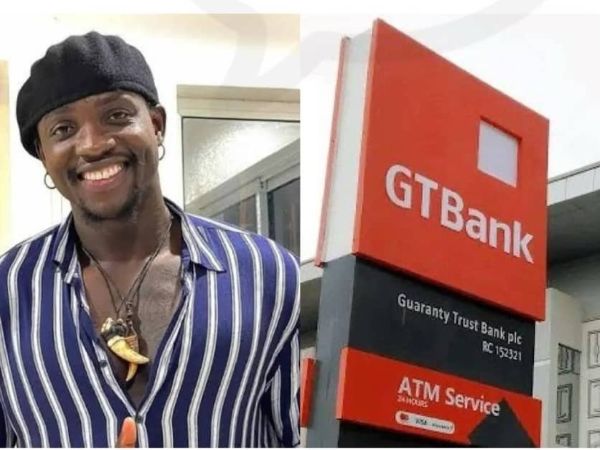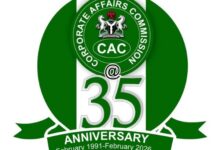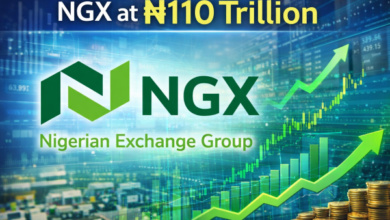
The unexpected arrest of controversial social media activist Martins Vincent Otse, popularly known as VeryDarkMan (VDM), within the premises of a Guaranty Trust Bank (GTBank) branch in Abuja, has triggered national debate on customer rights, institutional accountability, and the rising tension between civic activism and law enforcement in Nigeria.
The Incident: A Timeline of Shock and Controversy
VDM had reportedly walked into the GTBank branch in Area 3, Abuja, to lodge a complaint over unauthorized deductions from his mother’s bank account. According to his lawyer, Barrister Deji Adeyanju, what should have been a routine customer grievance escalated into a controversial arrest facilitated—if not directly orchestrated—by the bank.
Adeyanju alleges that VDM was deliberately locked inside GTBank’s security-controlled exit door for over five minutes, ostensibly to buy time for operatives of the Economic and Financial Crimes Commission (EFCC) to arrive and apprehend him. He described the episode as a “coordinated ambush” and vowed legal action against the bank for its alleged complicity and inhumane treatment of his client.
Adeyanju further confirmed that the EFCC detained VDM and a friend who accompanied him, and that his legal team, led by lawyer Marvin Omorogbe, had already made contact with the detained activist. However, VDM was said to have refused to leave his cell or meet with anyone.
A Deeper Concern: Weaponization of Institutions Against Dissent?
This incident raises far more troubling questions than it answers.
- Why was the EFCC involved in what appeared to be a customer complaint case?
- What role—if any—did GTBank play in facilitating or initiating the arrest?
- Has civic activism become so threatening to the status quo that financial institutions are now being co-opted into silencing critics?
VDM, known for his blunt, often controversial takes on public issues via social media, has consistently challenged both state and private-sector establishments. This isn’t his first brush with authority, but the involvement of a Tier 1 Nigerian bank and a federal anti-corruption agency over what appeared to be a personal banking issue is unprecedented and dangerous in a democratic society.
GTBank’s Silence and the Risk to Brand Integrity
As of the time of filing this report, GTBank had not issued an official statement clarifying its role in the incident. This vacuum of information is not just problematic—it is potentially damaging.
GTBank, one of Nigeria’s most respected financial brands, has long prided itself on customer-centric innovation and transparency. Any perception that it could act as a tool for arbitrary arrest—or worse, deny a customer access to legal complaint processes—risks eroding public trust and investor confidence.
In the absence of a swift and clear explanation, GTBank faces a potential brand crisis. Social media is already awash with calls for account closures and boycotts. Consumer advocacy groups are also beginning to question how secure Nigerian bank customers truly are—especially when their complaints could lead to detention rather than resolution.
Legal & Regulatory Implications: Lines Blurred
At the heart of this case is a troubling blurring of legal boundaries. The EFCC is a statutory agency mandated to investigate and prosecute financial crimes. Unless VDM is suspected of such an offence—and that suspicion is substantiated—the involvement of the commission in a customer-bank dispute seems both excessive and procedurally questionable.
Legal experts argue that if the arrest was linked to a social media post or prior civil action, then due process—including invitation, questioning, and court approval—must precede detention. Anything short of this risks reinforcing the narrative that Nigeria is sliding into soft authoritarianism, where institutions serve power rather than the people.
Why Banks and Brands must take heed
The VeryDarkMan saga is more than a trending topic—it is a flashing red signal for Nigeria’s corporate sector. Banks, telecoms, and tech platforms, in particular, must now recalibrate their crisis response strategies, ethical codes, and relationships with enforcement agencies. Public confidence is not infinite. Once broken, it is difficult—and costly—to restore.
What to Watch:
- GTBank’s official statement and potential legal liability.
- EFCC’s justification for the arrest and public response.
- Civil society’s mobilization and potential lawsuits.
- The ripple effects on regulatory oversight in Nigeria’s banking sector.
More Than Just a Viral Story
This is not merely about a controversial influencer. It is about power, process, and the protection of fundamental rights in Nigeria. In an era where digital voices are becoming louder, institutions—both public and private—must learn to engage constructively, not coercively.
VDM’s arrest at GTBank is a stress test of Nigeria’s democratic resilience, and how it is resolved may set the tone for civic freedoms, corporate accountability, and institutional credibility for years to come.
BRANDECONOMY will continue to follow the unfolding developments, bringing you verified insights and expert perspectives on the intersection of business, governance, and society in Nigeria.












